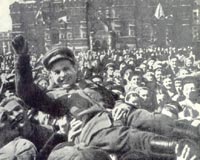 |
 |
 |
May 1945 found me in the Austrian Alps near the city of Gratz. It was spring and sunny, beautiful winter resorts were visible on the snow-covered mountains. Everybody was in high spirits; the war should be over soon.
My Radio Reconnaissance battalion (the 345th) took the bearings of German troop locations and movements. I listened to the daily news from Berlin, London and New York on captured radio equipment and wrote reports for the Front headquarter.
One day I heard on the BBC, 'Sweden's Council-General has announced that Hitler has informed him of his decision to capitulation.' On May 2nd Berlin reported, 'Adolph Hitler has died due to serious wounds. Admiral Donitz has taken command of the German troops.'
Finally, on May 7th, while listening to the American broadcast I heard, 'This is the Voice of America, America at war." this was how all VOA broadcasts during those years began, "Germany has agreed to surrender unconditionally! Tomorrow this decision will be signed!'
That evening I was given the urgent order to exchange this exciting news for wine in the nearby towns. As there was no wine left in the towns behind our lines a driver and myself left for the front. All around us was an unusual silence. The war was no longer working.
In the villages recently evacuated by the Germans there was still plenty of wine. Many of the wine barrels were shot through and half empty. This was the result of our advanced troops wine-tasting. We needed only full barrels. At last we found an undamaged village and went to the nearest house. I told them about Hitler death and tomorrow's German capitulation. The news spread quickly through the village. Soon people filled the room. The burgomaster, a fat man wearied in suede shorts and a green hat with a feather, invited everyone into his house. He told us how he had always loved Russians and hated Hitler. His son, who had been taken prisoner by the British, would now be coming home soon.
We drank dry wine with the Austrian men, some dressed in shorts, some in pants, with both young and old women, attractive and unattractive. Soon all of them seemed pretty to me. Austrians were singing yodels; the driver and me sang the Russian song 'Katyusha'. After a while, swaying, we made our way back to the street. Our truck was full of barrels of wine now. The Austrians helped us climb back into the truck's cabin. I still wonder how we made the drive back to our unit without crashing.
On the night of May 9th the war was officially declared over. Our battalion had a ceremonial dinner. Everybody got one and a half liters of the wine that I had delivered. At least that was the official dose; actually you could drink as much as you wanted. By that evening, no one could safely stand on his own two feet. Guns fired everywhere. Green and red tracer bullets crossed the sky. One could think it was a battle, but it was the peace celebration. The world and all around me were drunk with wine and the knowledge that at long last it was all over. It was the VICTORY!
 |
 |
 |
Austria was a good and beautiful country, but what we really wanted so badly was to go home.
Translated by: Kirill Finkelshteyn Proofreader: James Quinn
| MAIN PAGE |
Rus |
mailto: kfinkelshteyn@narod.ru